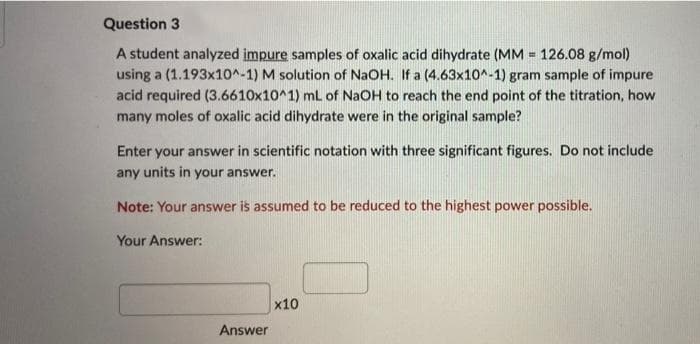Question 3 A student analyzed impure samples of oxalic acid dihydrate (MM = 126.08 g/mol) using a (1.193x10^-1) M solution of NaOH. If a (4.63x10^-1) gram sample of impure acid required (3.6610x10^1) mL of NaOH to reach the end point of the titration, how many moles of oxalic acid dihydrate were in the original sample? Enter your answer in scientific notation with three significant figures. Do not include any units in your answer. Note: Your answer is assumed to be reduced to the highest power possible. Your Answer: x10
Question 3 A student analyzed impure samples of oxalic acid dihydrate (MM = 126.08 g/mol) using a (1.193x10^-1) M solution of NaOH. If a (4.63x10^-1) gram sample of impure acid required (3.6610x10^1) mL of NaOH to reach the end point of the titration, how many moles of oxalic acid dihydrate were in the original sample? Enter your answer in scientific notation with three significant figures. Do not include any units in your answer. Note: Your answer is assumed to be reduced to the highest power possible. Your Answer: x10
Chemistry: Principles and Reactions
8th Edition
ISBN:9781305079373
Author:William L. Masterton, Cecile N. Hurley
Publisher:William L. Masterton, Cecile N. Hurley
Chapter4: Reactions In Aqueous Solution
Section: Chapter Questions
Problem 36QAP
Related questions
Question

Transcribed Image Text:Question 3
A student analyzed impure samples of oxalic acid dihydrate (MM = 126.08 g/mol)
using a (1.193x10^-1) M solution of NaOH. If a (4.63x10^-1) gram sample of impure
acid required (3.6610x10^1) mL of NaOH to reach the end point of the titration, how
many moles of oxalic acid dihydrate were in the original sample?
Enter your answer in scientific notation with three significant figures. Do not include
any units in your answer.
Note: Your answer is assumed to be reduced to the highest power possible.
Your Answer:
x10
Answer
Expert Solution
This question has been solved!
Explore an expertly crafted, step-by-step solution for a thorough understanding of key concepts.
This is a popular solution!
Trending now
This is a popular solution!
Step by step
Solved in 2 steps

Knowledge Booster
Learn more about
Need a deep-dive on the concept behind this application? Look no further. Learn more about this topic, chemistry and related others by exploring similar questions and additional content below.Recommended textbooks for you

Chemistry: Principles and Reactions
Chemistry
ISBN:
9781305079373
Author:
William L. Masterton, Cecile N. Hurley
Publisher:
Cengage Learning

Chemistry
Chemistry
ISBN:
9781305957404
Author:
Steven S. Zumdahl, Susan A. Zumdahl, Donald J. DeCoste
Publisher:
Cengage Learning

Chemistry: An Atoms First Approach
Chemistry
ISBN:
9781305079243
Author:
Steven S. Zumdahl, Susan A. Zumdahl
Publisher:
Cengage Learning

Chemistry: Principles and Reactions
Chemistry
ISBN:
9781305079373
Author:
William L. Masterton, Cecile N. Hurley
Publisher:
Cengage Learning

Chemistry
Chemistry
ISBN:
9781305957404
Author:
Steven S. Zumdahl, Susan A. Zumdahl, Donald J. DeCoste
Publisher:
Cengage Learning

Chemistry: An Atoms First Approach
Chemistry
ISBN:
9781305079243
Author:
Steven S. Zumdahl, Susan A. Zumdahl
Publisher:
Cengage Learning

Chemistry & Chemical Reactivity
Chemistry
ISBN:
9781337399074
Author:
John C. Kotz, Paul M. Treichel, John Townsend, David Treichel
Publisher:
Cengage Learning

Chemistry & Chemical Reactivity
Chemistry
ISBN:
9781133949640
Author:
John C. Kotz, Paul M. Treichel, John Townsend, David Treichel
Publisher:
Cengage Learning

Chemistry by OpenStax (2015-05-04)
Chemistry
ISBN:
9781938168390
Author:
Klaus Theopold, Richard H Langley, Paul Flowers, William R. Robinson, Mark Blaser
Publisher:
OpenStax